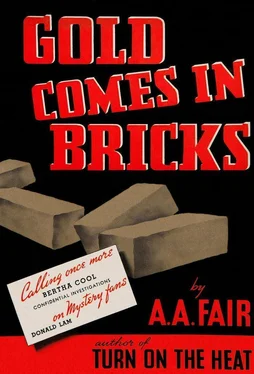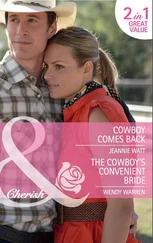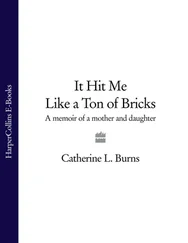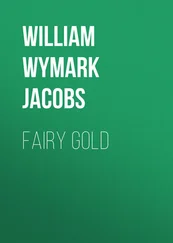“What do you want?” he asked, indicating a homemade bench by a dilapidated stove which had been salvaged from a junk pile. There was a fire going in the stove, and a pot of beans simmering.
“I’m trying to get some of the old history of the place,” I said.
“What you want it for?”
“I’m a writer.”
“What you writing?”
“A history of gold dredging.”
Pete took the pipestem from his mouth and jerked it over his shoulder in the general direction of Valleydale. “They can tell you all about it.”
“They seem rather prejudiced,” I said.
Pete chuckled. It was a dry chuckle that was packed with philosophic amusement. “Helluva bunch,” he admitted.
I looked around the cabin. “This is a mighty cosy little place.”
“Suits me all right.”
“How did it happen the dredgers didn’t chew it up?”
“They had to leave it to keep the river out of the ground they were working. They intended to swing around and build a levee with tailings so they could come back to it later on. It didn’t work out that way.”
“How big a strip is it?”
“Oh, maybe half a mile long by a couple of hundred yards wide.”
“It’s nice-looking country. Was it all like this before the dredgers came?”
“Nope. This was wasteland. It had been worked by hand. The old tailing piles left by the Chinks are still here. They weren’t big piles, just four or five feet — there was some pretty good land here before the dredgers started farther up the valley.”
“This strip looks nice to me.”
“Uh-huh.”
“I saw some rabbits on it as I drove in.”
“Quite a few rabbits. I get a meal from ’em once in a while.” He jerked his head to indicate a rusted twenty-two calibre rifle which hung on the wall. “She doesn’t look like much outside, but she’s smooth as a mirror inside.”
“Who owns the land?”
His eyes glittered. “I do.”
“Makes it nice,” I said. “It’s better living this way than in town.”
“It is for a fact. The town’s dead. This place is all right. How’d you happen to find it?”
“Someone in town told me you were down here and could tell me something about the gold-dredging.”
“What do you want to know?”
“Oh, just general facts.”
Pete jerked his pipestem in the general direction of Valleydale again. “Those folks make me sick. I’ve seen the whole damned business from the start. The land around here was pretty good. In the old horse-and-buggy days it was just a jerkwater country town — then someone started promotin’ gold-dredgin’. Most of the inhabitants thought it wouldn’t work. They hung crape all over the idea, then when they found it would work, they went hog-wild. Real estate started goin’ up, an’ kept on goin’ up. No one would sell because they thought it was goin’ even higher. The Chamber of Commerce got busy. They kowtowed to the dredgin’ outfit, turned the whole town over to them. Everybody in town that wanted to work had a job, and then the company started importin’ men, lots of ’em. The town started boomin’. The merchants jacked prices up for all the traffic would bear. Every once in a while somebody would raise the question about what was goin’ to be left when the dredgin’ companies got done, and they’d all but tar an’ feather him an’ ride him out of town on a rail.
“Well, after a while things sort of levelled off. Then the birds that held the real estate thought it would be a good time to unload. The purchasers didn’t think so. Dredgers started cutting down on payrolls. There were homes for sale. Even then the Chamber of Commerce didn’t face the facts. They tried whistlin’ to keep their courage up. They thought a railroad was comin’ through. The town would be a big railroad centre. They were goin’ to put in rock crushers. There was a lot of hooey. Then things started goin’ downhill fast. Now, it’s like you see it today. Everybody’s cussin’ the dredgin’ company.”
“You worked for the dredging company?”
“Uh-huh.”
“When did you start working?”
“Just about the time they started dredging. I prospected this country.”
The fire blazed up a bit. The beans started bubbling until the steam raised the cover on the pot. Pete got up and shoved the beans a few inches to one side.
I said, “I’m very much interested in this.”
“A writer you say?”
“Yes. If you wanted to make a few dollars, I could spend an evening with you, picking up some local colour, and make it worth your while.”
“How much?”
“Five dollars.”
“Give me the dough.”
I gave him a five-dollar bill.
“Stay for supper?”
“I’d like to.”
“Nothin’ but beans, hot cakes, and syrup.”
“It sounds good to me.”
“You ain’t a game warden?”
“No.”
“Okay, I’ve got a couple of cold quail. Let’s get the eatin’ over with an’ we can talk later.”
“Can I help?”
“Nope. You sit still. Keep out of the way over in that corner.”
I watched him get supper and found myself envying him. The place was crude, but it was clean. Everything was shipshape, a place for everything, and nothing hanging around where it shouldn’t be. Cupboards had been made out of wooden cases which had originally held two five-gallon oil cans. These boxes had been placed one on top of the other and nailed in strips. Pete found two agate-ware plates, knives, and forks. The syrup, he explained, was homemade, half white sugar and half brown, with a little maple flavor. The hot cakes were big flapjacks cooked in a huge skillet and turned by the simple process of flop ping them over. There was no butter. The beans had lots of garlic. The gravy was thick. The quail had been broiled Pete explained, over wood coals. He said that he killed game, when it was out of season, away from the camp picked it, cleaned it, buried the skins, entrails, legs, and heads, built a little fire, broiled the game, and carried it in already cooked. He kept it in a place where “no damn snooping game warden would find it.”
“Bothered much with them?” I asked.
“There’s a guy in town that got himself appointed a deputy,” Pete said. “He comes out once in a while and looks the place over.” He gave his characteristic chuckle again, and said, “He don’t find nothin’.”
It was a nice dinner. I wanted Pete to let me help with the dishes, but he had them washed and dried while I was still arguing about it. Everything went back to its place in the boxes. Pete put the coal-oil lamp on the centre of the home-made table.
“Like cigarettes?” I asked.
“Nope. Stay with my pipe. It’s cheaper. I like it — more satisfaction in it.”
I lit a cigarette. Pete lit his pipe. It was a big hod, so thoroughly soaked with nicotine that it filled the place with a heavy odour I could all but taste. It smelled good.
“What do you want to know?” he asked.
“You did prospecting?”
“Yep.”
“How did you prospect? I shouldn’t think it would be possible, since the values were all under water.”
“In those days,” he said, “we had a Keystone Drill. It’s simple to prospect. You punch down a casing right through to bedrock. You lift the stuff out with a sand pump. Every thing that comes out of the sand pump goes into a tub, and you pan that out and save the colors of gold.”
“Colours?” I asked.
“Yep. It’s gold that’s been ground down by the action of rivers and glaciers until it’s in little fine flakes about as big around as a pin head and thin as a piece of paper. Sometimes it’ll take a lot of ’em to make even a cent’s worth of gold.”
“Then you must get pretty much out of each hole you drill.”
Читать дальше












